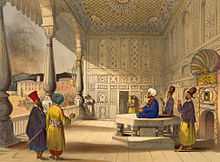National Reconciliation
 | ||||||||||||||||||||||||||||||||||||||||||
| History of Afghanistan | ||||||||||||||||||||||||||||||||||||||||||
|---|---|---|---|---|---|---|---|---|---|---|---|---|---|---|---|---|---|---|---|---|---|---|---|---|---|---|---|---|---|---|---|---|---|---|---|---|---|---|---|---|---|---|
| Timeline | ||||||||||||||||||||||||||||||||||||||||||
|
Ancient
|
||||||||||||||||||||||||||||||||||||||||||
|
Medieval
|
||||||||||||||||||||||||||||||||||||||||||
|
Modern
|
||||||||||||||||||||||||||||||||||||||||||
| ||||||||||||||||||||||||||||||||||||||||||
National Reconciliation is the term used for establishment of so-called 'national unity' in countries beset with political problems. In Afghanistan Mohammad Najibullah's proposals for national unification started in 1987 and ended early in the 1990s to stop the Afghan civil war which had haunted the country since 1978 after the Saur Revolution.[1] At the National Reconciliation meeting they came to the conclusion that the Soviet armed forces in Afghanistan should withdraw.[2]
The new constitution
In 1985 Mikhail Gorbachev was selected Secretary General of the Communist Party of the Soviet Union. Gorbachev pushed new president Mohammad Najibullah to come with a peace proposal in the Democratic Republic of Afghanistan. On 15 January 1987 Najibullah requested a six-month ceasefire between Mujahideen and government forces, in this period he came up with various of proposals aimed at "National Reconciliation." The resistance replied to these proposals at a general meeting in Ghur Province in July 1987. The meeting was called together by Mujahideen resistance leader Ismail Khan in Herat Province. Najibullah's proposal was rejected and the six-month ceasefire agreement ended.[1]
Under Najibullah's leadership a new constitution was ratified by the Loya jirga in 1987. The new constitution abolished the one-party system in the country and saw the establishment of the Meli Shura (Loya jirga), Sena (Senate) and the Wolasi Jirga (House of Representatives) which would eventually replace the Revolutionary Council which had been the ruling organ since the PDPA's establishment in 1965.[3] The word "Democratic" was also removed from the country's official name, and since 1987 the official name of the country was the Republic of Afghanistan. Islam became the official state religion again after the talks.[1]
References
- ↑ 1.0 1.1 1.2 Willem Vogelsang. The Afghans. Google Books. Retrieved 2009-03-22.
- ↑ Douglas A. Borer. Superpowers defeated. Google Books. Retrieved 2009-03-22.
- ↑ Eur, Europa Publications Staff and Europa Publications. The Far East and Australasia 2003. Google Books. Retrieved 2009-03-22.
External links
| ||||||||||||||